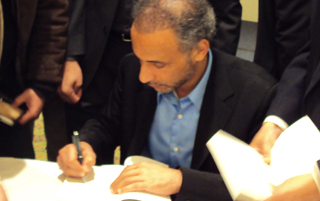
The Islamic Circle of North America's Council for Social Justice held its first annual banquet on December 24, 2010, raising over $50,000 in support of its projects like feeding the nation's poor and advocating for humanitarian immigration reform.
The event, held at the Holiday Inn Rosslyn in Arlington, Virginia, attracted over 300 guests. Many came to hear keynote speaker Professor Tariq Ramadan.
After brief opening remarks and an introduction on the Council for Social Justice by Executive Director Naeem Baig, a man who exemplifies the need for social justice work in America took the stage.
Darryl Hunt, a North Carolina Muslim who spent 19 years in prison before being released in 2003 when evidence came to light that he was in fact innocent, gave a moving argument on the need for organizations that specialize in helping the oppressed and wronged.
“My family was the community … I wouldn't be here if people didn't stand up,” said Hunt, who now advocates on behalf of the wrongfully imprisoned. Christian groups and civil rights activists worked hard to reopen Hunt's case. A documentary on Hunt's case played during dinner.
Imam Khalid Griggs, the Chairman of the Board of Directors for the ICNA Council for Social Justice, addressed the gathering next, stressing the need for the Muslim community to get involved in local issues of social justice. “[The people working for Darryl Hunt's freedom] looked around and wondered 'where are the Muslims?',” said Imam Griggs.
The highlight of the evening was undoubtedly Dr. Tariq Ramadan's keynote speech in which the popular Islamic activist and thinker outlined his vision of “social justice” to a rapt audience.
The two prongs of social justice are to be “humble with Allah, and ambitious with humanity” said Ramadan, adding that social justice is a means – not an end – to get “peace within ourselves and in our societies”. The three dimensions of social justice are dignity, equality, and well being, and three things he advised Muslim activists were to work for everyone, not just Muslims; come in with ethics; and be courageous in the face of challenges.
Dr. Ramadan signed copies of his books, available for sale, at the close of the program.
Listen to the Keynote speech here:
{mp3remote}http://dl.dropbox.com/u/6462078/tariq%20ramadan%20on%20social%20justice%20--%20Dec%2024%202010%20--%20ICNA%20Social%20Justice%20Council%20Dinner.mp3{/mp3remote}









Comments powered by CComment